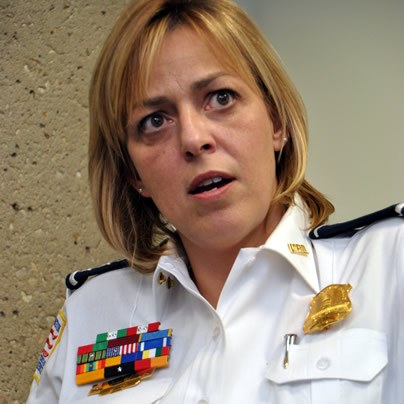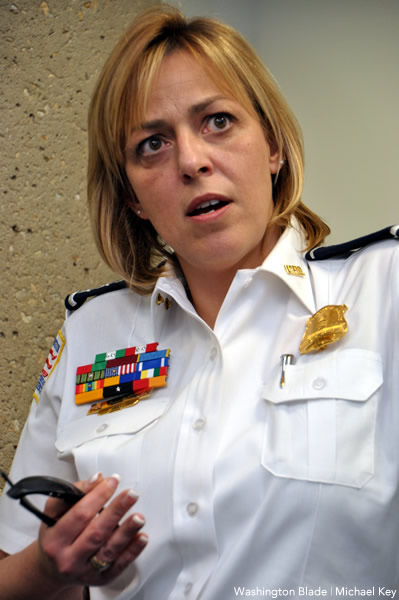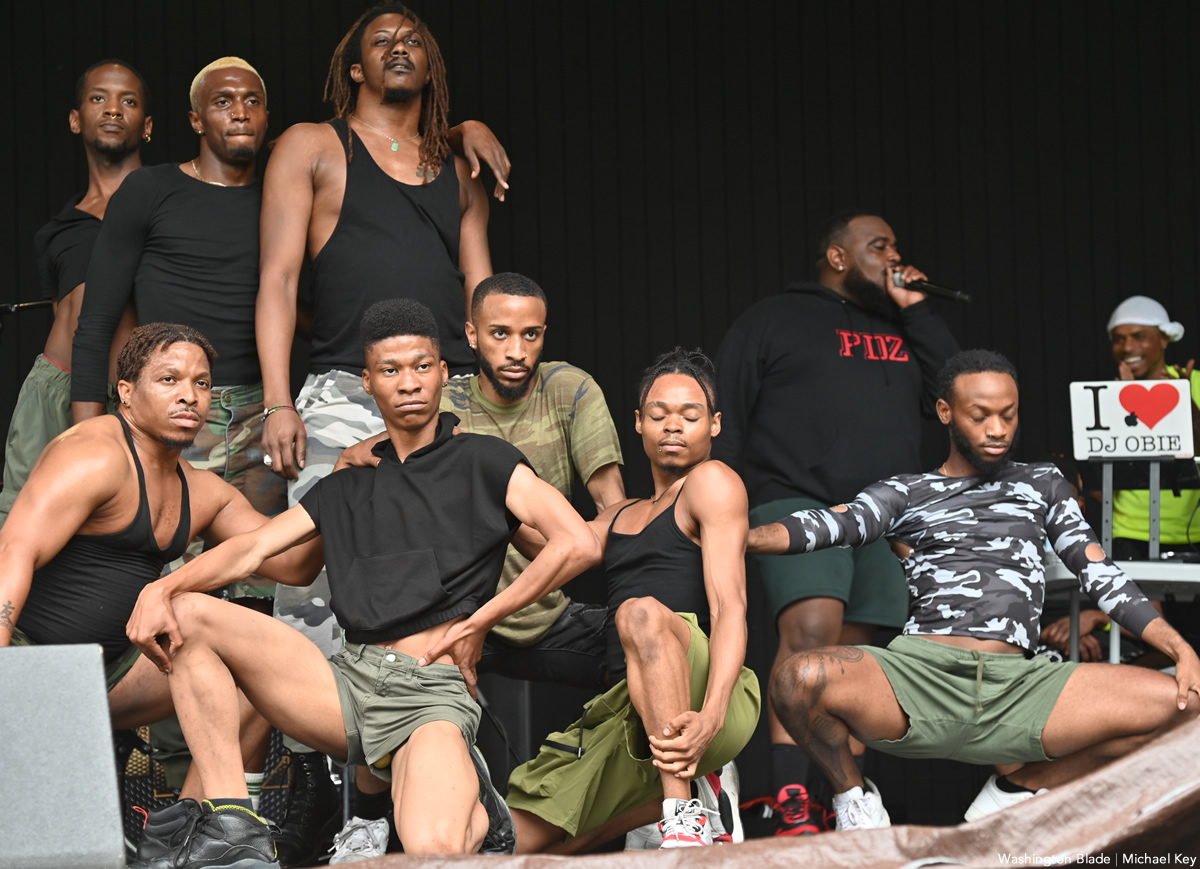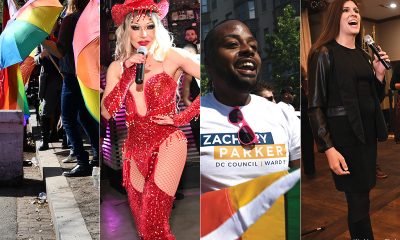Local
Police gay liaison unit transferred to patrol duty
Critics say action decreases effectiveness of GLLU


D.C. Police Chief Cathy Lanier has reassigned members of the department’s GLLU to street patrol duties. (Washington Blade file photo by Michael Key)
A decision by D.C. Police Chief Cathy Lanier to indefinitely reassign members of the department’s Gay and Lesbian Liaison Unit to street patrol duties in the Sixth and Seventh Police Districts is hindering their ability to respond to LGBT-related calls throughout the city, according to sources familiar with the Metropolitan Police Department.
A statement released on behalf of Lanier by MPD spokesperson Gwendolyn Crump disputes this claim, saying the GLLU and at least one other specialized unit whose officers have also been detailed to other assignments “are still operational and doing what they have done in the past” to serve the LGBT and other communities.
But the sources, who spoke on condition of anonymity, said the GLLU’s four active officers previously assigned to the GLLU headquarters office in Dupont Circle have most recently been assigned to patrol a single location deemed a high-crime area – the 1500 block of Alabama Avenue, S.E. – and must obtain permission to answer a GLLU call outside that location.
“That permission is not always granted,” said one of the sources.
The GLLU and the three other specialized units serving the Latino, Asian-Pacific Islander, and deaf and hard of hearing communities routinely have been temporarily detailed to street patrol and other assignments since former D.C. Police Chief Charles Ramsey created the units in the 1990s.
The latest change, believed to have been initiated by Assistant Chief Diane Groomes, who heads the department’s patrol division, is different than past detail assignments because it has no known termination date and appears to be an indefinite reassignment for the units, the sources said.
One of the sources said the department also rearranged the work shifts for members of all four liaison units. Prior to these changes, the four units collectively had officers on duty seven days a week, 24 hours a day except for one hour, the source said. Now, according to the source, no core liaison officer is on duty during a period from 4 a.m. to 10 a.m. every day.
“Specific units such as the GLLU and the Asian Liaison Unit have been deployed to the Sixth and Seventh Police District over the last several weeks to enhance community outreach in areas of the city that have seen a high demand and call volume from specific communities represented by the Liaison Division,” Crump said in her statement.
“Even though the officers were given specific areas to patrol and provide community outreach in, the officers are still available to respond to any area of the city to assist when calls for service come in as well as follow up with victims as they have in the past,” Crump said.
She noted in her statement to the Blade that the latest change came in response to a review of last year’s calls for service to the GLLU. She said a “large volume” of calls came from the Sixth and Seventh Districts and that many of the calls were for incidents of domestic violence.
“Domestic/family violence is a huge concern, and the number of domestic/family violence crimes and incidents that are taking place in the Sixth and Seventh Police Districts involving members of the LGBT community is something that urgently needs to be addressed by the members of the GLLU and Special Liaison Division,” Crump said.
The Seventh District is located in the far Southeast section of the city east of the Anacostia River. The Sixth District consists of a section of far Southeast and part of far Northeast D.C.
The sources familiar with the GLLU who spoke to the Blade said GLLU officers are committed to responding to domestic violence calls and doing all they can to assist victims of domestic violence. But two of the sources said deploying the GLLU’s four currently active core officers to a single block on Alabama Avenue would do little to help curtail domestic violence.
“So how do they respond more quickly to domestic violence if they’re told not to leave the area that they’ve been assigned?” asked one of the sources.
Another source said that since the GLLU officers were detailed nearly two months ago “they haven’t been doing what they normally do and that’s to go out to all wards of the city and all the districts and do outreach and crime patrols and stuff like that,” said the source. “So that’s why they haven’t been around” and seen in the LGBT community in other parts of the city, the source said.
Capt. Edward Delgado, commander of the Special Liaison Division, has in the past issued a weekly and sometimes biweekly report sent by email describing the types of calls to which each of the four liaison units responded and the location of the calls. Delgado’s report also described specific patrol locations where the units, including the GLLU, were assigned each week.
The Blade stopped receiving the reports around the time the GLLU officers were detailed to their new assignments in the Sixth and Seventh Districts.
One of the sources said all four special liaison units had been detailed to areas in the Sixth and Seventh Districts. Crump’s statement only mentions the GLLU and the Asian Liaison Unit as having been detailed to the new locations.
Sterling Washington, director of the Mayor’s Office of GLBT Affairs, said Delgado told him the changes were limited to the GLLU and the Asian Liaison Unit.
The MPD website page for the Special Liaison Division included a chart early this week that showed there were six “core” members of the GLLU and 110 affiliate GLLU members based in the seven police districts and in other police units.
Lanier created the affiliate program for the liaison units shortly after becoming chief in 2007 as a means of strengthening the reach and capabilities of the units. Affiliate members receive special training related to the specific liaison unit to which they join, the chief has said. She has said they are trained to respond to liaison unit calls but remain assigned to their regular police duties in the police districts.
The sources, however, said the core GLLU officers, who are in charge of training the affiliate members, aren’t informed by police officials about how many affiliate members respond to GLLU-related calls. One source wondered whether most of the officers listed as affiliate members actually respond to any GLLU calls or are involved in LGBT related police matters.
The sources said the list of core GLLU officers shown on the website was outdated in that only four of the six listed were currently active with the unit. The website chart identifies the core GLLU members as Officers Kevin Johnson, Justin Markiewicz, Joseph Morquecho, Zunnobia Hakir, Juanita Foreman, and Sgt. Carlos Mejia. The chart shows Mejia as serving both the GLLU and the Latino Liaison Unit.
According to the sources, Officer Hakir is on indefinite maternity leave and Sgt. Mejia was no longer with the GLLU or the Latino Liaison Unit. Sgt. Matthew Mahl, who had been serving as acting supervisor of the GLLU in the recent past, is currently working with the GLLU three days a week on limited duty while recovering from a work-related injury, the sources said.
In her statement, Crump said plans are under way for new activities for the GLLU and other liaison units.
“In the coming months, members of the GLLU and the Special Liaison Division as a whole will launch various community outreach initiatives throughout all of the police districts focusing on the different concerns within each specific community and geographic location,” she said.
“Each police district has different needs, so the Special Liaison Division remains flexible to provide the best possible service and community outreach everywhere,” Crump said.
District of Columbia
New D.C. LGBTQ+ bar Crush set to open April 19
An ‘all-inclusive entertainment haven,’ with dance floor, roof deck

D.C.’s newest LGBTQ+ bar called Crush is scheduled to open for business at 4 p.m. on Friday, April 19, in a spacious, two-story building with a dance floor and roof deck at 2007 14th St., N.W. in one of the city’s bustling nightlife areas.
A statement released by co-owners Stephen Rutgers and Mark Rutstein earlier this year says the new bar will provide an atmosphere that blends “nostalgia with contemporary nightlife” in a building that was home to a popular music store and radio supply shop.
Rutgers said the opening comes one day after Crush received final approval of its liquor license that was transferred from the Owl Room, a bar that operated in the same building before closing Dec. 31 of last year. The official opening also comes three days after Crush hosted a pre-opening reception for family, friends, and community members on Tuesday, April 16.
Among those attending, Rutgers said, were officials with several prominent local LGBTQ organizations, including officials with the DC Center for the LGBTQ Community, which is located across the street from Crush in the city’s Reeves Center municipal building. Also attending were Japer Bowles, director of the Mayor’s Office of LGBTQ Affairs, and Salah Czapary, director of the Mayor’s Office of Nightlife and Culture.
Rutgers said Crush plans to hold a grand opening event in a few weeks after he, Rutstein and the bar’s employees become settled into their newly opened operations.
“Step into a venue where inclusivity isn’t just a promise but a vibrant reality,” a statement posted on the Crush website says. “Imagine an all-inclusive entertainment haven where diversity isn’t just celebrated, it’s embraced as the very heartbeat of our venue,” the statement says. “Welcome to a place where love knows no bounds, and the only color or preference that matters is the vibrant tapestry of humanity itself. Welcome to Crush.”
The website says Crush will be open Tuesdays and Wednesdays from 4 p.m. to 12 a.m., Thursdays from 4 p.m. to 2 a.m., Fridays from 4 p.m. to 3 a.m., Saturdays from 2 p.m. to 3 a.m., and Sundays from 2 p.m. to 12 a.m. It will be closed on Mondays.
Crush is located less than two blocks from the U Street Metro station.
District of Columbia
Reenactment of first gay rights picket at White House draws interest of tourists
LGBTQ activists carry signs from historic 1965 protest

About 30 LGBTQ activists formed a circular picket line in front of the White House Wednesday afternoon, April 17, carrying signs calling for an end to discrimination against “homosexuals” in a reenactment of the first gay rights protest at the White House that took place 59 years earlier on April 17, 1965.
Crowds of tourists looked on with interest as the activists walked back and forth in silence in front of the White House fence on Pennsylvania Avenue. Like the 1965 event, several of the men were dressed in suits and ties and the women in dresses in keeping with a 1960s era dress code policy for protests of the Mattachine Society of Washington, D.C., the city’s first gay rights group that organized the 1965 event.
Wednesday’s reenactment was organized by D.C.’s Rainbow History Project, which made it clear that the event was not intended as a protest against President Joe Biden and his administration, which the group praised as a strong supporter of LGBTQ rights.
“I think this was an amazing event,” said Vincent Slatt, the Rainbow History Project official who led efforts to put on the event. “We had twice as many that we had hoped for that came today,” he said.
“It was so great to see a reenactment and so great to see how far we’ve come,” Slatt said. “And also, the acknowledgement of what else we still need to do.”
Slatt said participants in the event who were not carrying picket signs handed out literature explaining the purpose of the event.
A flier handed out by participants noted that among the demands of the protesters at the 1965 event were to end the ban on homosexuals from working in the federal government, an end to the ban on gays serving in the military, an end to the denial of security clearances for gays, and an end of the government’s refusal to meet with the LGBTQ community.
“The other thing that I think is really, really moving is some of the gay staff inside the White House found out this was happening and came out to greet us,” Slatt said. He noted that this highlighted how much has changed since 1965, when then President Lyndon Johnson’s White House refused to respond to a letter sent to Johnson from the Mattachine Society explaining its grievances.
“So now to have gay people in the White House coming out to give us their respects and to say hello was especially meaningful to us,” Slatt said. “That was not expected today.”
Among those walking the picket line was longtime D.C. LGBTQ rights advocate Paul Kuntzler, who is the only known surviving person who was among the White House picketers at the April 1965 event. Kuntzler said he proudly carried a newly printed version of the sign at Wednesday’s reenactment event that he carried during the 1965 protest. It stated, “Fifteen Million Homosexuals Protest Federal Treatment.”
Also participating in the event was Japer Bowles, director of D.C. Mayor Muriel Bowser’s Office of LGBTQ Affairs. Bowles presented Slatt with a proclamation issued by Bowser declaring April 17, 2024, Mattachine Society Day in Washington, D.C.
“Whereas, on April 17, 1965, the Mattachine Society of Washington courageously held the nation’s inaugural picket for gay rights, a seminal moment in the ongoing struggle for LGBTQIA+ equality in the United States, marking the genesis of public demonstrations advocating for those rights and paving the way for Pride Marches and Pride celebrations worldwide,” the proclamation states.
About 30 minutes after the reenactment event began, uniformed Secret Service agents informed Slatt that due to a security issue the picketers would have to move off the sidewalk in front of the White House and resume the picketing across the street on the sidewalk in front of Lafayette Park. When asked by the Washington Blade what the security issue was about, one of the Secret Service officers said he did not have any further details other than that his superiors informed him that the White House sidewalk would have to be temporarily cleared of all people.
Participants in the event quickly resumed their picket line on the sidewalk in front of Lafayette Park for another 30 minutes or so in keeping with the 1965 picketing event, which lasted for one hour, from 4:20 p.m. to 5:20 p.m., according to Rainbow History Project’s research into the 1965 event.
Although the LGBTQ picketers continued their procession in silence, a separate protest in Lafayette Park a short distance from the LGBTQ picketers included speakers shouting through amplified speakers. The protest was against the government of Saudi Arabia and organized by a Muslim group called Al Baqee Organization.
A statement released by the Rainbow History Project says the reenactment event, among other things, was a tribute to D.C.-area lesbian rights advocate Lilli Vincenz, who participated in the 1965 White House picketing, and D.C. gay rights pioneer Frank Kameny, who founded the Mattachine Society of Washington in the early 1960s and was the lead organizer of the 1965 White House protest. Kameny died in 2011 and Vincenz died in 2023.
The picket signs carried by participants in the reenactment event, which were reproduced from the 1965 event, had these messages:
• “DISCRIMINATION Against Homosexuals is as immoral as Discrimination Against Negroes and Jews;”
• “Government Should Combat Prejudice NOT PROMOTE IT”
• “White House Refuses Replies to Our Letters, AFRAID OF US?
• “HOMOSEXUALS Died for their Country, Too”
• “First Class Citizenship for HOMOSEXUALS”
• “Sexual Preference is Irrelevant to Employment”
• “Fifteen Million U.S. Homosexuals Protest Federal Treatment”
District of Columbia
Organizers announce details for D.C. Black Pride 2024
Most events to take place Memorial Day weekend at Westin Downtown

The Center for Black Equity, the organizer of D.C. Black Pride, the nation’s first and one of the largest annual African-American LGBTQ Pride celebrations, announced this year’s event will take place Memorial Day Weekend from May 24-27.
The announcement, released April 16, says that most 2024 D.C. Black Pride events will take place at the Westin Washington, D.C. Downtown Hotel at 999 9th St, N.W.
“With the theme Black Pride Forever, the event promises a weekend filled with vibrant celebrations, empowering workshops, and a deep exploration of Black LGBTQIA+ history and culture,” the announcement says.
It says events will include as in past years a “Rainbow Row” vendor expo at the hotel featuring “organizations and vendors created for and by the LGBTQIA+ community” offering products and services “that celebrate Black excellence.”
According to the announcement, other events include a Health and Wellness Festival that will offer workshops, demonstrations, and activities focused on “holistic well-being;” a Mary Bowman Poetry Slam “showcasing the power and beauty of spoken word by Black LGBTQIA+ artists;” the Black Pride Through the Decades Party, that will celebrate the “rich history of the Black LGBTQIA+ movement;” and an Empowerment Through Knowledge series of workshops that “delve into various topics relevant to the Black LGBTQIA+ community.”
Also, as in past years, this year’s D.C. Black Pride will feature its “Opening Night Extravaganza” reception and party that will include entertainment and live performances.
The announcement notes that D.C.’s annual Black Pride celebration, started in 1991 as a one-day outdoor event at Howard University’s Banneker Field, has inspired annual Black LGBTQ Pride events across the United States and in Canada, United Kingdom, Brazil, Africa, and the Caribbean. More than 300,000 people attend Black LGBTQ Pride events each year worldwide, the announcement says.
Full details, including the official schedule of events, can be accessed at dcblackpride.org.
-

 Africa4 days ago
Africa4 days agoCongolese lawmaker introduces anti-homosexuality bill
-

 World4 days ago
World4 days agoOut in the World: LGBTQ news from Europe and Asia
-

 District of Columbia3 days ago
District of Columbia3 days agoReenactment of first gay rights picket at White House set for April 17
-

 Africa3 days ago
Africa3 days agoUgandan activists appeal ruling that upheld Anti-Homosexuality Act










